- feature
- PRACTICE MANAGEMENT
‘When everything became very real’
CPAs recall the onset of the COVID-19 pandemic and the impact it had on their work.
Please note: This item is from our archives and was published in 2021. It is provided for historical reference. The content may be out of date and links may no longer function.
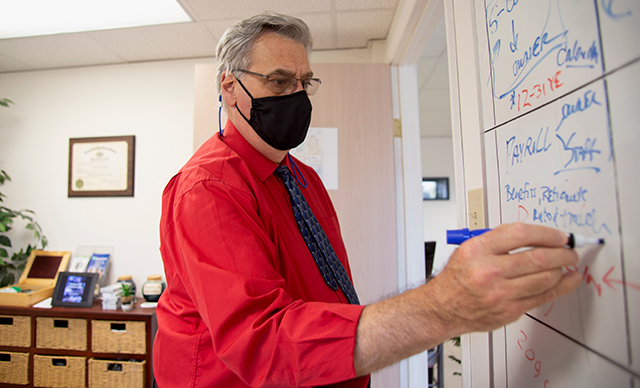
Related
7 retirement tips for small firm CPAs
Start risk management with employee onboarding
2025 tax software survey
TOPICS
March 2020, when cases of COVID-19 started popping up in the United States, feels like a very long time ago and like yesterday, all at the same time. Without much notice, everyone’s lives were upended as the nation tried to stem the spread of the virus, and CPAs, just like everyone else, had to quickly adjust to new ways of working.
As a new year sure to bring new challenges unfolds, the JofA asked eight CPAs to look back and share their experiences, both early in the pandemic and as they settled in to working remotely, learned how to advise clients about the Paycheck Protection Program and other measures, and found new ways forward.
Brief profiles of the CPAs are included with their photos. Their answers have been edited for clarity and conciseness.
When did you realize COVID-19 was going to affect you personally?
Aaron T. Clayton: The week before [the firm’s work-from-home decision] I traveled up to North Dakota. We still went out to restaurants and really did the same things you would normally do. That Monday, that week we decided to go home, to me it still wasn’t real. … When they canceled March Madness, I was like, “Holy cow! This must be a big deal.”
Shawana Hudson: March is when everything became very real. I have two sons, and one was a senior in high school at the time. And they were discussing in school the possibility of schools closing with the stay-at-home orders. And so it was very real, having a teenager in his senior year.
Jim Newhard: COVID hit right in the teeth of tax season. When [Pennsylvania Gov. Tom Wolf] announced the statewide quarantine, you had to dig through the statement of who was defined by the state as essential personnel. Actually, the very first draft that came out the first day of quarantine, accounting firms were not deemed essential. That was revised within 48 to 72 hours.
Eugene Park: I can remember it beginning in another country. I have a father in South Korea, so he’s relatively close [to COVID-19’s origin point], and so obviously he was taking it pretty seriously. As soon as he saw it hit the U.S., he was making sure we were washing our hands and all that sort of stuff. … My wife, she’s a public health nurse, so a news story hits, she’s kind of hearing things at the county level. After listening to my wife, [I knew] this was pretty serious.
Gwen Stoute: Being in Houston in mid-March, we always go to the Houston Rodeo. They have huge concerts, and it’s a two- or three-week thing. They started talking about canceling the Houston Rodeo, which is a huge revenue stream for the city of Houston. … That really expanded my perception of how big of a deal this is. That’s when it really kind of started sinking in, that we’re homebound — this is more serious than I thought.
Dalton Sweaney: I was meeting with an individual tax client. At the end of our meeting, he’s like, “Hey, just so you know, I’ve got some inside connections with the governor, and there’s an order coming out today.” … As soon as my day was over, I think it was 5:30 or so, I cut out of the office early, and I went to the grocery store just to buy food in case we weren’t really able to leave the house. And I think it ended up being while I was at the grocery store that Gov. [Gavin] Newsom made the initial order for California.
Jeff Wilson: When COVID’s hitting, I’m still in the office — we’re all in the office. The county is going through Phase 1, Phase 2, Phase 3, and we’re all listening to [Maryland Gov. Larry Hogan] talk about it, and the governor just shuts it down. I’m at the teacher’s association’s office [a client] and everybody’s like, “OK, pack it up. We’re all going home.” So that’s exactly what we did.
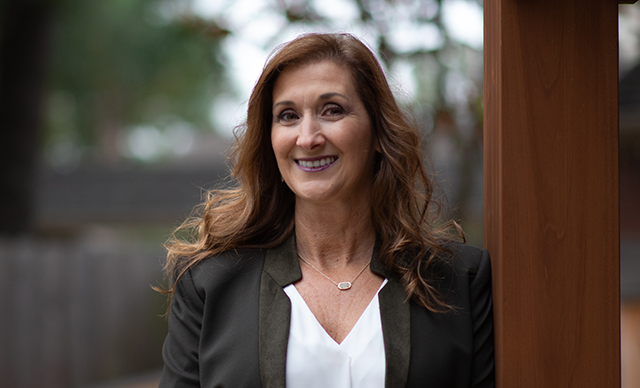
Partner (employee benefit plan audit)
HoganTaylor, Fayetteville, Ark.
HoganTaylor has approximately 350 employees.
(Photo by Brandon Thibodeaux/AP Images)
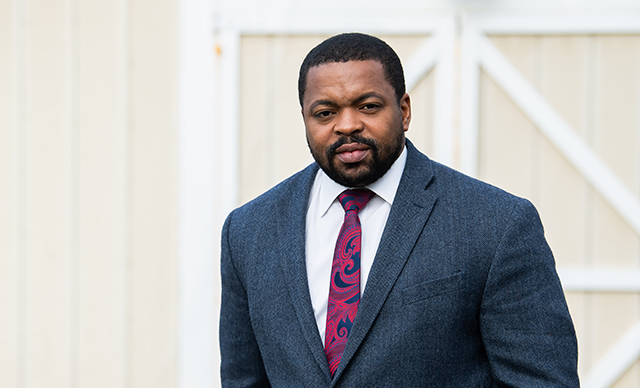
Owner (audit and accounting services)
The W2 Group, Upper Marlboro, Md.
The W2 Group has four employees.
(Photo by Joy Asico/AP Images)
How did your firm make decisions about working remotely, using technology, changing work procedures, and so forth?
Clayton: We pulled everybody into the conference room on the audit side, and we talked about, “Hey, this is what we’re doing. We’re doing this to protect you. We’re doing this to protect our clients. We’re going to send everybody home.” From a true operational standpoint, we’ve had the technology to work remotely for a long time … and so everybody went home that day.
Hudson: We had invested years ago in software that allows us to audit from anywhere. The transition for the tax folks was a little more challenging. … We went through a period in late March where there was a lot more training and refreshing on what capabilities we had, what’s the most efficient way to connect to our server. There were some hiccups, and there were some inefficient days.
Stoute: We already had the technology in place to be able to work remotely for the most part. However, we had clients who didn’t necessarily have the capability to be able to work remotely. And so our [technology group] was able to help the clients that needed help. Old computers that we had that had been turned in, they wiped them and would loan them out and helped some clients get set up to work remotely.
Sweaney: I think a big one was the growing uneasiness of our team. You could just feel that they were getting a little less comfortable. I think March 30 or 31, right around then, was when we basically said, “We’re stopping preparing tax returns. We’re putting all of our efforts into making us fully remote. This is our last week here.”
Wilson: Our firm is completely virtual. Before I realized the school problem [was going to create new demands on my time], I was kind of like a kid in a candy store. I was like, “Everybody’s trying to figure out how to work from home, we’re already winning.” I thought I had a competitive advantage. … Then I looked at my son, who is virtually learning — then I realized the things I had to do. So that slowed us down a little bit.
Wood: Through our tech stack we were actually more virtual of a firm than we thought we were. With our phone system being a VoIP system, [our administrative team has] been able to continue to manage our phone system, manage our calendar scheduling, and through our CRM system [they’re] still interacting with clients. The only thing we missed was our lobby greeter. … We chose to close the office and go to a virtual, by-appointment schedule.
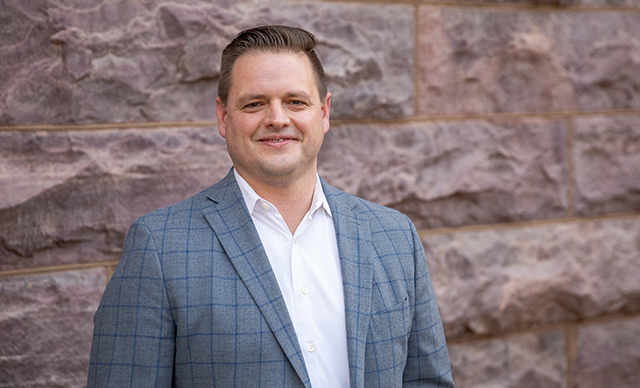
Partner in charge of communications and electric (audit)
Eide Bailly, Sioux Falls, S.D.
Eide Bailly has 2,500+ employees.
(Photo by Jay Pickthorn/AP Images)
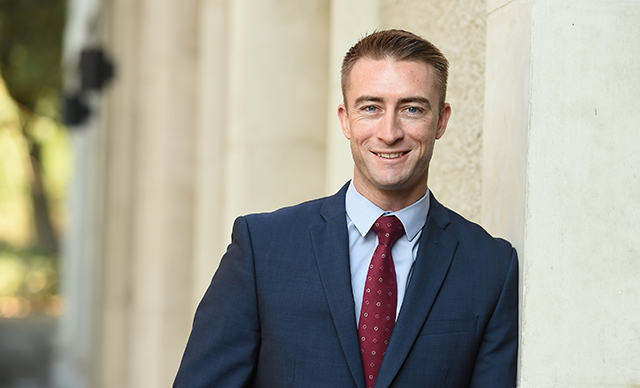
Partner (tax and accounting services)
Gray, Salt & Associates, Claremont, Calif.
Gray, Salt & Associates has six employees.
(Photo by Jordan Strauss/AP Images)
What was it like to navigate this in the middle of tax season? What impact did the changing IRS and state tax filing deadlines have on you?
Newhard: Once there was a realization that it was going to get pushed on beyond April 15, there was a collective letdown of urgency. Some people go, “Wow, well now we don’t have to worry about it until July.” … New Jersey, one of our neighbors, was the last state … to postpone the April 15 deadline. They did that on April 14.
Sweaney: We were running and sprinting and working and trying to get through everything. It was like every client that hadn’t finalized their return disappeared off the face of the earth. Nobody wanted to put their tax information in. We couldn’t hear back from anybody. … I don’t think we would have made it without that [extension]. Usually, I’m like, “Man, I just want to be done.” But I did not feel that way at all with this. I felt so fortunate to have that extra time.
Wood: A lot of people asked us, “Wow, they moved the dates 90 days, I bet that really helps you out.” … We have a year-round focus with all our clients where we have different deliverables and different marks we have to hit throughout the year. The moving of the due date really just moved it into a date where we had already sold out of all of our inventory. So it didn’t help us. The people who were historically procrastinators saw an opportunity to possibly get in on time, so you had a logjam there in the summer.

Audit partner
HeinfeldMeech, Phoenix
HeinfeldMeech has approximately 50 employees.
(Photo by Mark Peterman/AP Images)
How did the rollout of the Paycheck Protection Program (PPP) affect you?
Clayton: The biggest thing for everybody, whether you’re in audit or tax, was PPP. I don’t know how much time that added to most of my days, but it was quite a bit. … Internally, we had so many meetings trying to update all our people on what was going on with PPP so that we could make sure we were staying in touch with our clients and being a resource for them, to make sure they got the funds that they needed to if they were in a situation where it was necessary for them.
Hudson: We were learning and trying to get up to speed in order to serve as those trusted advisers in that PPP space. … In daily huddles, we were having conversations about the changes to legislation as it was rolling out. There was a lot of asking questions and trying to come up with cohesive responses for our clients when their questions arose. But that certainly put some strain on our people because that added to all the other things that we were still trying to stay on top of.
Newhard: You’re just monitoring legislation, tax administrators, IRS, departments of revenue, local government. Not to mention from the other side monitoring FASB and AICPA for financial reports and special disclosures.
Sweaney: We have all these mom-and-pop shops that, without PPP, I don’t know how many of them would have been able to kind of keep it going, to figure out how they could make it work in this climate. … We made a decision early on to not charge for any of that work. We wanted to be a resource in giving them real information. The challenging aspect was just how what was the right answer became the wrong answer so quickly. You would kind of get up to speed on something, and then, all of a sudden, that was outdated.
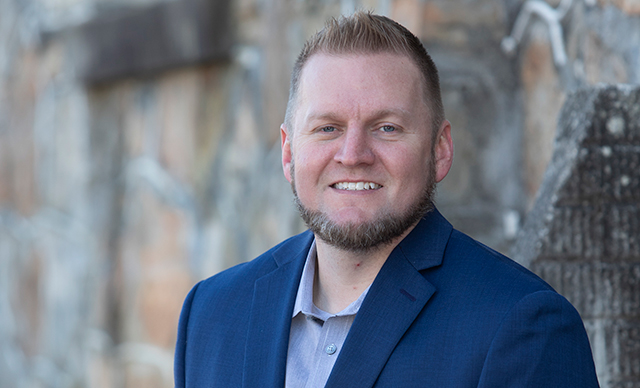
Partner (client accounting and advisory services)
Compere Robinette CPAs, Ozark, Mo.
Compere Robinette has 11 employees.
(Photo by Colin Braley/AP Images)
What impact did this have on your day-to-day work?
Clayton: My first week I spent working at our dining room table, and it was the worst experience ever. My kids were at home, running behind me. … I had an office, but we had just moved into the house and still had some boxes and stuff in it, not set up at all. My wife and my daughter helped me get it all set up. … The biggest impact was probably not having the same level of interaction with team members. Like many, we found virtual ways to connect and stay in contact.
Hudson: At the end of December, we had one of our founding partners retire. So there was already some strain on capacity for audit, and that was his primary role. What we had to adjust to was making sure that our clients were on board with our remote-working strategy. It was complicated because some of them were unsure of when they would reopen or what their office staff hours would be like. … We have a plan, an audit calendar, that’s really built on our experience with clients in years past, and we kind of fold folks in like Tetris to make sure it all works. And when one of those blocks doesn’t fall just right, we’re having to adjust.
Newhard: I have clients who are individuals. I have clients who are retired. I have clients in all types of situations, and adjusting to all those situations and advising them, or at least giving them some guidance — people were calling. “What do I do about this? And what do I do about that?” Running all these different what-if situations for them — it’s really hard to bill some people for that. … I put in as many or more hours than I ever did before.
Park: Working primarily with school districts — it was obviously very stressful for them. From our perspective, auditwise, the audit was probably less stressful since we do the majority of our work prior to March. Their deadline is March 31, so most fieldwork is done by then. Auditwise, it was probably less stressful, but everything-else-wise, I guarantee you they were stressed. They had to figure out how they were going to educate students, how to ensure they were still going to be getting their funding based on student attendance, and how do they account for all that.
Stoute: The first thing that we did that really impacted our employee benefit plan group was our training. … Now, instead of having all of our offices come together for this 2½-day training, we had to figure out how to do it remotely. So the first day we still did a full-day training and realized real quickly you can’t do online training all day. People don’t have the attention span. It’s just so much harder when you have kids in the background and whatever. Working remotely, you have to kind of work when you can work, depending on what your home situation is.
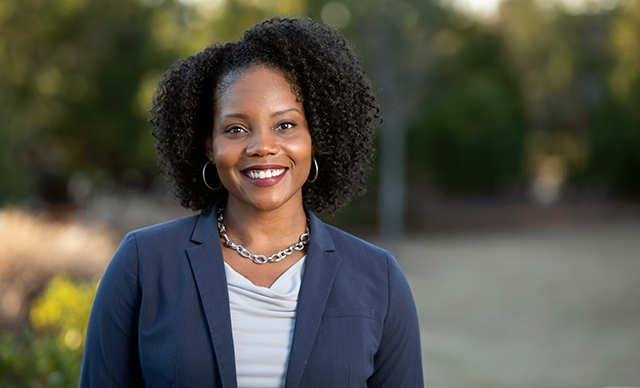
Partner (audit)
Thomas & Gibbs CPAs, Durham, N.C.
Thomas & Gibbs has 15 employees.
(Photo by Brent Clark/AP Images)
What was the overall pandemic experience like?
Hudson: On a personal level, just working out logistics with kids still doing school at home and working [was challenging]. What that means, though, is that my boys get a better sense of what mom does, so that’s been interesting.
Park: I used to say, “Embrace the awkward.” This has obviously been the most challenging year in trying to kind of continue to live by that and try to really be comfortable with the uncomfortable. … I think that’s a silver lining, that even with such a rapid change, people are able to adapt.
Wood: The community of CPAs I’m part of made this palatable. It made it possible to come out on the other side. I think about the endless nights of being on various Slack channels with CPA colleagues — hundreds of CPA colleagues. … It was just this ongoing, live discussion, interpretation of all the changes. The community was everything to get through this.
About the author
Mark Tosczak is a freelance writer based in North Carolina. To comment on this article or to suggest an idea for another article, contact Chris Baysden, a JofA associate director, at Chris.Baysden@aicpa-cima.com.
AICPA resources
Online resources


















